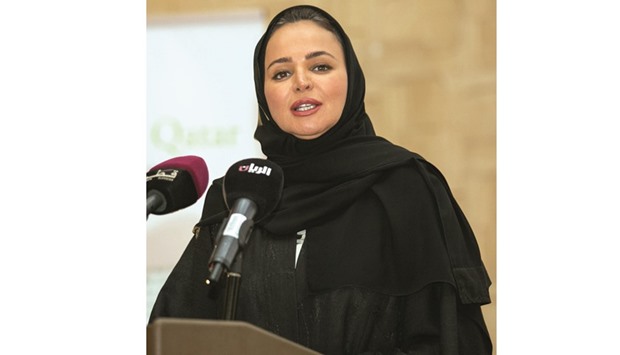To develop passion and dedication among Qatar’s future entrepreneurs, the concept of entrepreneurship must be taught at a young age, Injaz Qatar chairperson Sheikha Hanadi bint Nasser al-Thani has said.
Describing entrepreneurship as “a mindset,” Sheikha Hanadi underscored the role of Injaz Qatar in helping instil a culture of entrepreneurship among young students in the country.
Injaz Qatar is a non-profit organisation and member of Junior Achievement (JA) Worldwide, which teaches the youth about the value of enterprise through educational programmes.
“Passion and dedication is the basis for entrepreneurship. At Injaz, we try to promote entrepreneurship from a very young age by tapping students going to middle schools, high schools, and universities,” Sheikha Hanadi told Gulf Times.
“In my view, entrepreneurship is another way of thinking. It does not only aim to open a private enterprise, a shop, or a company but it is a mindset — it is thinking in a different way about providing service, establishing a policy or procedure within an organisation,” she explained.
According to Sheikha Hanadi, the culture of entrepreneurship is inherent among Qataris, citing Qatar’s once prosperous pearl industry, which was later overshadowed after oil explorations transformed the country into the world’s largest LNG exporter.
“In Qatar, we are a trading society. We were harvesting pearls in the old times, and our grandfathers were once the biggest traders of pearls in the world hence, entrepreneurship runs in our blood,” she said.
She further explained that “unfortunately, after the oil boom, the pearl industry went down into our priorities list.”
“But now, as you can hear from HH Sheikh Tamim bin Hamad al-Thani’s speeches, he is looking for a private sector that thrives with new ideas and tries to promote economic development within our economy.
“And His Highness is also looking for innovation from the public sector, as well. And for me, that is entrepreneurship. As Injaz, we have a special kind of model whereby we tap private companies that can finance our programmes, which we know are beneficial to the youth,” she stressed.
By “mixing and matching” life experiences and well-established business theories, Sheikha Hanadi said Injaz Qatar tries to “Arabise” its programmes to make them applicable to the student’s lifestyle.
“JA has developed programmes but we ‘Arabise’ them by adding local aspects so that when we teach them to students, they know they are applicable to their own lives. This is not something that is purely academic or knowledge-based; these programmes are practical applications to one’s life,” she emphasised.
Sheikha Hanadi noted that the programmes are delivered to students through Injaz Qatar volunteers, whose experiences and professional backgrounds come from a range of sectors that help hone the skills of young students.
“These are important skills for a successful human being no matter if the person is an entrepreneur or in the public sector. Whatever you are, you need these skills to succeed. This is what’s unique about Injaz’s model — it is by the private sector and it provides a very important service to society as a whole.
“And the model being delivered by our volunteers provides more meaning because they are not paid for their time. They come here willingly to share their experience and knowledge,” she said.

Injaz Qatar chairperson Sheikha Hanadi bint Nasser al-Thani delivers a speech during the recent launching of the ‘Injaz Ambassadors’ programme.

